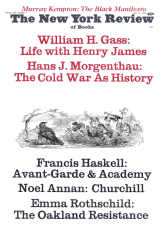In response to:
The Writing on the Wall from the January 30, 1969 issue
To the Editors:
Mary McCarthy is so much out of sympathy with Orwell that one wonders why she undertook to review the Collected Essays, Journalism and Letters of George Orwell [NYR, January 30]. In her eagerness to find fault with Orwell she ignores the fact that the collection was made by his second wife, Sonia, and Ian Angus.
Since Orwell had nothing to do with decisions to leave out or to include, it seems at least excessive to devote many columns to the enumeration of sins of omission not committed by him. It is sheer malice to suggest that letters to his parents and friends were not included because the recipients must have thrown them away. Sonia Orwell included only one letter to his first wife and, with fine impartiality, only one to herself and only one to his mother. Orwell gets the blame for that. And why are there no love letters? Why indeed.
The absence of the words Auschwitz and genocide from the index prompts the suspicion that Orwell was indifferent to or disbelieved in the existence of extermination camps. But when Mary McCarthy wants to make a point against him she tells of a patriotic poem he wrote “not reprinted here,” proving that absence does not mean non-existence. Incidentally, the fact that he wrote this poem as a schoolboy is not mentioned. MM’s bias causes her to miss the irony in Orwell’s confessed liking for Hitler. He gets blamed for contracting tuberculosis, and we are inanely assured that no American writer ever had this disease. Orwell is even blamed for frequently descending into the lower depths to see how it is with the downtrodden and the oppressed, although he could not otherwise have written Down and Out in Paris and London which she claims to be his best book.
Whenever Orwell was guilty of sweeping remarks we are sure to hear of it, and with emphasis, as when he thought with the rest of the leftist world that British imperialism was worse than Hitler. But he gets no credit when he stands alone. Thus when he tears the mask off Stalin we are immediately assured that he was “not unique in this.” Well, he was unique at the time and place when he denounced Stalin, the fellow travelers, and the parlor pinks. He was so alone that he could not get his Homage to Catalonia and Animal Farm published in the US.
His Homage to Catalonia, published in England during the Spanish Civil War, found no readers although it was the only honest account of Communist criminal attacks on the Anarchist Trade Unions and the non-communist Left, complete with GPU and torture cellars to extract confessions.
His Animal Farm was published in England during the Second World War when Stalin was a trusted and admired ally of the Western World forced into this position by virtue of Hitler’s attack on Russia.
The mystery of all this cavil becomes clear in the end. Mary McCarthy is not writing a book review but engaging in polemics with the ghost of Orwell. Although she comes to no final conclusion in her speculations on Orwell’s possible attitude to American intervention in Vietnam, MM says that he would have regarded her as a new pink and “objectively” prototalitarian. He might indeed, since in her writings on the subject of Vietnam, MM has slipped back into the simplistic view of the pre-World War leftists who thought that Hitler being bad, Stalin must be good. The slave labor camps of Stalin were not mentioned for fear that such admissions would only serve the cause of the Nazis. Just so, there is now silence on the extermination of the peasants resisting collectivization in North Vietnam. If it were admitted that big brother Ho Chi Minh is as ruthless as Stalin, it could only help the American military and their South Vietnam puppets. Let the truth be the casualty for the sake of polity.
It is quite certain that Orwell would have had none of this, as he refused to play this game in Homage to Catalonia. MM apparently resents Orwell’s insistence on the whole truth to the point of wishing him dead. She writes: “If he had lived, he might have been happiest on a desert island, and it was a blessing probably that he died.”
Wishing him dead for his own good as it were, MM reveals that he is very much alive, demanding that the truth be told not only about American bombing of North Vietnam but also about the atrocities committed by the Viet Cong against the cities and the civilian population of South Vietnam, and about the domination achieved by the Viet Cong in the villages of South Vietnam by the systematic terrorizing of the peasantry, and finally about the Vietnamese voting with their feet against Ho Chi Minh as shown by the flow of millions of refugees from the North to the South.
Summing up, Mary McCarthy pronounces Orwell a political failure “because he left no ideas behind to germinate.” Yet earlier in the review we hear that a translation of his 1984 into Hungarian “is said to have been the catalyst of the Hungarian Revolution.” Qu’est ce qu’il vous faut, Madame?
Gabriel Jansicas
New York City
This Issue
July 10, 1969



